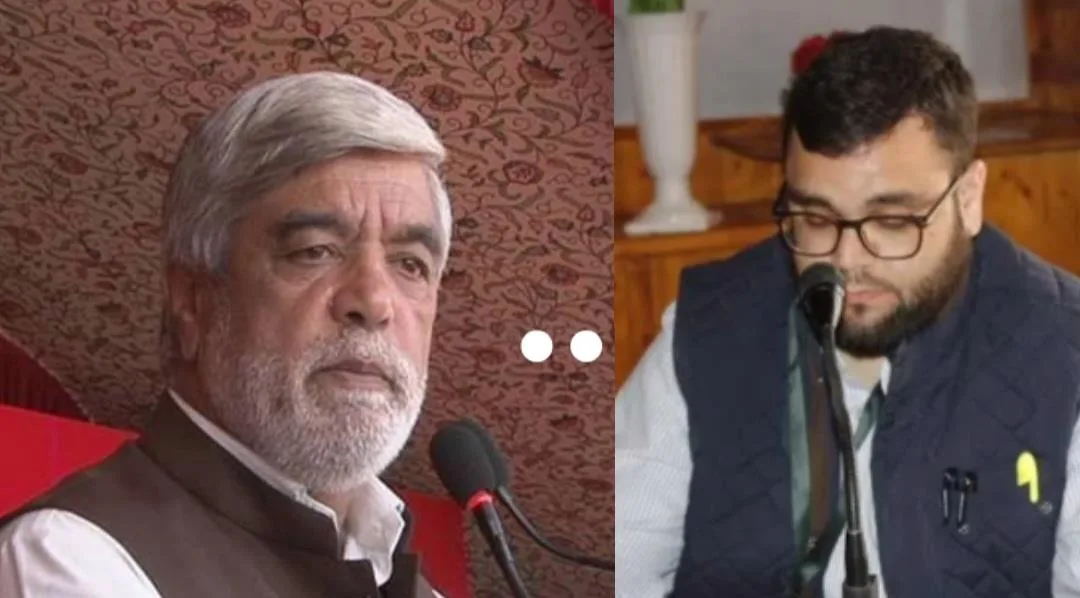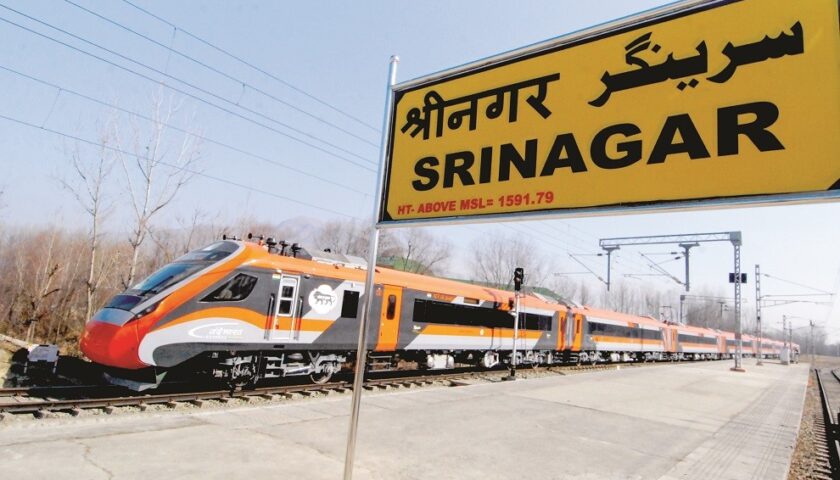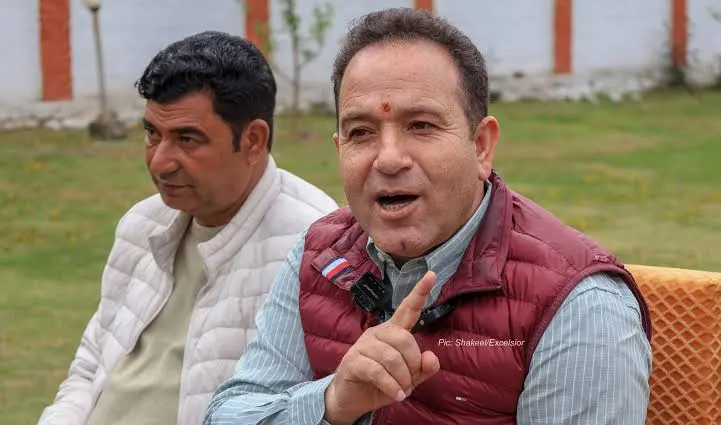With NC, PDP, and BJP fielding Aga candidates, the contest transcends party lines—testing loyalties, legacies, and the future of Shia representation.
An Unprecedented Political Triangle in Central Kashmir
The upcoming Budgam Assembly by-election, scheduled for November 11, 2025, has taken an extraordinary turn — not because of its high-profile parties, but because of its unusually personal political dynamics.
For the first time in Kashmir’s electoral history, three prominent candidates from the same Shia clerical lineage — all bearing the title “Aga” — are locked in direct political confrontation.
Each carries distinct political allegiance, personal legacy, and community following, making Budgam 2025 one of the most symbolically charged contests in Jammu and Kashmir’s post-Article 370 politics.
Aga Syed Mehmood: The Loyalist and the Establishment Face
Representing the Jammu & Kashmir National Conference (JKNC), Aga Syed Mehmood stands as the official candidate backed by Chief Minister Omar Abdullah.
A veteran politician and former minister, Mehmood embodies the traditional National Conference ethos — institutional governance, regional autonomy, and continuity of legacy.
His candidacy holds both strategic and emotional weight. The Budgam seat became vacant after Omar Abdullah, who won it in 2024 with a comfortable margin, chose to retain his Ganderbal constituency.
By fielding Mehmood, the NC aims to reaffirm its historical roots in Budgam, a constituency it has held since 1977, while also signaling stability amid political volatility.
However, Mehmood’s campaign faces a challenge from within.
Senior NC leader and three-time Budgam MLA Aga Syed Ruhullah Mehdi has refused to campaign for him — a rare public snub that underscores internal dissent and the fragility of intra-party unity.
Ruhullah, a key Shia political figure and once seen as NC’s rising star, has kept a deliberate distance, hinting at ideological differences and unresolved grievances within the party.
Aga Syed Muntazir Mehdi: The Reformist Challenger
Flying the PDP flag, Aga Syed Muntazir Mehdi positions himself as the reformist face of a changing Kashmir.
Younger and more attuned to the language of youth, technology, and reform, Muntazir represents a generational shift within Budgam’s Shia political narrative.
He previously contested the 2024 Assembly election but lost to Omar Abdullah. This time, however, the stage is different — the Chief Minister is not in the fray, and voter fatigue with establishment politics may work to his advantage.
Muntazir’s campaign blends community identity with policy critique, emphasizing issues like unemployment, poor infrastructure, and the erosion of civil liberties.
He has sought to redefine Shia representation not through clerical authority but through youth-centric activism and a call for political accountability.
“People want dignity, not dynasty,” Muntazir declared at a recent rally in Beerwah, capturing a sentiment resonating with first-time voters.
His campaign slogans, branding him as a voice of change, are also designed to chip away at NC’s traditional vote base, especially among younger Shia voters who grew up after the 1990s insurgency and are less bound by historical party loyalties.
Aga Syed Mohsin: The BJP’s Bet on Shia Representation
Representing the Bharatiya Janata Party (BJP), Aga Syed Mohsin is the third contender — and perhaps the most intriguing.
His candidacy gives the Budgam bypoll a national political dimension, injecting BJP’s “integration and development” narrative into a constituency historically dominated by regional parties.
Though not a mass figure, Mohsin is well-connected in community networks and is being quietly projected by the BJP as a moderate voice within the Shia intelligentsia — someone who can bridge the ideological divide between Srinagar and New Delhi.
By fielding a local Shia face rather than a parachuted candidate, the BJP appears to be testing its Valley outreach strategy — focusing less on immediate victory and more on gradually normalizing political engagement in central Kashmir.
Political observers believe the BJP’s entry in Budgam, even if symbolic, helps polarize the contest, forcing NC and PDP to recalibrate their messaging in a constituency now witnessing multi-dimensional ideological competition.
Factionalism and the Battle for the Shia Vote
The Shia community in Budgam, concentrated across Beerwah, Magam, and Khan Sahib belts, has long been a key electoral bloc.
Historically loyal to the National Conference, the community’s voting pattern has slowly diversified over the years — first toward the PDP in the 2000s, and now, potentially, toward emerging alternatives.
The presence of three ‘Aga’ candidates — each with spiritual lineage and local reverence — has led to what one analyst called “a vote of conscience within the community.”
Behind the campaign rallies and political rhetoric lies a more personal battle for legitimacy.
Each Aga traces descent from influential clerical families whose influence extends beyond politics — into religious, cultural, and philanthropic spheres.
Their rivalry reflects a deeper redefinition of Shia political identity in post-Article 370 Kashmir — moving from religious custodianship to civic leadership.
Personal Rivalries Turn Political Faultlines
Local observers note that personal relationships among the Aga families have long been intertwined with political affiliations and grievances.
Over time, these divisions have mirrored the broader polarization between regional parties and the Centre.
Aga Mehmood’s alignment with the ruling establishment has drawn both respect and criticism — respect for continuity, and criticism for perceived complacency.
Aga Muntazir, by contrast, is seen as a dissenter within the clerical class, aiming to separate faith from power.
Aga Mohsin, meanwhile, represents the nationalist spectrum, appealing to voters who favor integration and stability.
This triangular dynamic has made Budgam’s political atmosphere volatile yet vibrant, with public meetings, door-to-door campaigns, and digital outreach all reflecting a rare blend of theology and politics.
Election Timeline
-
Nomination Filing Deadline: October 20, 2025
-
Scrutiny of Nominations: October 22, 2025
-
Withdrawal of Nominations: October 24, 2025
-
Polling Date: November 11, 2025
-
Counting and Results: November 14, 2025
The Election Commission of India has assured tight security arrangements and increased polling staff, particularly across sensitive pockets where community sentiments run high.
What’s at Stake
For the National Conference, victory would reaffirm its dominance in central Kashmir and consolidate Omar Abdullah’s position after one year in power.
For the PDP, a strong performance would signal revival after years of political marginalization.
For the BJP, even a modest vote share could demonstrate growing acceptability in the Valley’s Shia heartland — a long-term investment in local optics.
Beyond the numbers, however, Budgam 2025 is a referendum on political identity — on whether faith-linked leadership can evolve into modern representation in a post-special-status Kashmir.
Voters’ Voice: Between Loyalty and New Aspirations
On the ground, voters express mixed emotions.
Older residents remain loyal to traditional party structures, while youth demand transparency, jobs, and dignity over dynastic narratives.
“We have respect for all the Agas, but respect is not enough anymore. We need results,”
said Rafiqa Bano, a 45-year-old shopkeeper in Chadoora.
“It’s no longer about who you are — it’s about what you do,”
added Yasir Mehdi, a student from Magam.
This shift in mindset underscores a generational transition — from reverence to results, and from symbolism to substance.
A Battle Beyond Ballots
The Budgam by-election is more than a political contest — it’s a reflection of how Kashmir’s community leadership is redefining itself in a transformed constitutional setup.
The convergence of three ‘Aga’ candidates reveals the complex interplay of tradition, reform, and national politics in a constituency at the heart of the Valley.
Whether the verdict crowns loyalty, rebellion, or reinvention, Budgam 2025 will leave an imprint far deeper than electoral arithmetic — it will define how faith, politics, and identity co-exist in the next chapter of Jammu and Kashmir’s democracy.




